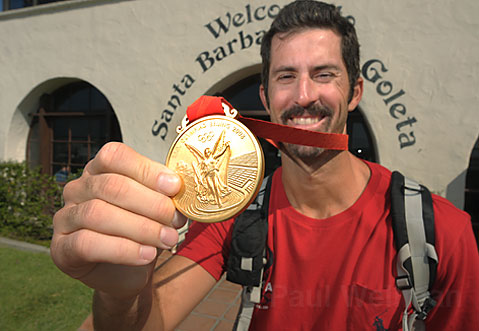Bye Bye Beijing
2008 Olympics Come to a Close, with San Marcos High Grad Terry Schroeder atop Coaching Pack

On the last day of the Beijing Olympics, Mike Krzyzewski appeared to have outdone Michael Phelps. The U.S. basketball coach wore 12 gold medals, draped over his shoulders by the members of the Redeem Team that had reclaimed America’s preeminence in the world of hoops.
Another coach who deserved accolades was Hugh McCutcheon, who guided the U.S. men’s volleyball team to a gold medal while, off the court, dealing with the sorrow and pain of a madman’s assault that killed his father-in-law and left his mother-in-law seriously wounded.
But purely from a coaching standpoint, the most remarkable job at the Olympics may have been done by Terry Schroeder. Last summer, he took over a floundering U.S. men’s water polo program that had gone through several coaching changes and lost a chunk of funding from the U.S. Olympic Committee. The team was not expected to improve on its seventh-place finish in Athens in 2004, but Schroeder instilled the men with such confidence in a year’s time that they shocked Croatia, overpowered Serbia, and went all the way to the championship game last Sunday. They settled for the silver medal after Hungary, which reveres water polo as its national sport, pulled away in the final quarter for a 14-10 victory. It was Hungary’s third consecutive Olympic gold.
Schroeder has iconic status as an Olympian. A couple years after graduating from San Marcos High, he was a member of the national team that missed playing in the boycotted 1980 Olympics. In 1984 and 1988, Schroeder led the U.S. men to silver medals. He also had his physique sculpted outside the L.A. Coliseum as the male athletic ideal, and he was chosen the U.S. flag-bearer at the conclusion of the 1988 Games in Seoul. He earned worldwide respect in his sport as a rugged player who would get beat up and come back for more. “You could drop an anvil on Terry’s head,” U.S. coach Monte Nitzkowski once said, “and he wouldn’t wince.”
In 1992, Schroeder was coaching at Pepperdine and working as a chiropractor with his wife, Lori, when he was lured back into the pool. For the third time, he was chosen captain of the U.S. water polo team. A fourth-place finish at Barcelona did not detract from his fulfillment in what he thought would be his last shot at Olympic glory.
It was out of patriotism and his love of the sport that Schroeder took up the challenge of coaching the 2008 team. He moved their training base close to his home in Westlake Village and scheduled pre-Olympic games in the area, including a June 8 contest at Dos Pueblos High in which Australia outscored his team 11-9. But the Americans came through when it counted in Beijing and matched their highest achievement in Olympic water polo-not counting a bogus gold in 1904 when the U.S. was the only participant.
BEIJING BITS: The U.S. water polo women, including Santa Barbara’s Kami Craig, also ended up with silver medals after a heartbreaking 9-8 loss to the Netherlands. : Mark Warkentin finished eighth in the inaugural Olympic 10,000-meter open-water swim. Then the Santa Barbara swimmer had to deal with a gnarlier situation-his family faced interrogation at a police station because they had been staying in the same rental complex as some Americans who had staged a protest on behalf of Tibet. The demonstrators were deported. Although Warkentin’s family was let go without punishment, he said in an email: “Sadly, I lost a bit of my enthusiasm for China.” : Beach volleyball may be eye-candy to much of the viewing public, but it’s a serious sport in Southern California, which makes me wonder why the L.A. Times relied on Chicago Tribune writers to cover the Olympic beach tournament. It’s like the Tribune assigning an L.A. writer to cover the Cubs. : On September 6-7, the AVP beach volleyball tour comes to Santa Barbara after an absence of 16 months. Todd Rogers and Phil Dalhausser won their second title as a team here in May of 2006. Since then, they have won 30 more tournaments, including the Olympic gold.
SOCCER’S HERE: UCSB hosts a soccer doubleheader at Harder Stadium on Friday, August 29-the women playing the University of San Diego at 5 p.m., the nationally ranked men taking on the Air Force Academy at 7:30 p.m. : Santa Barbara City College is hosting the College of the Sequoias at La Playa Stadium the same day, the women at 2 p.m. and the men at 7 p.m.



